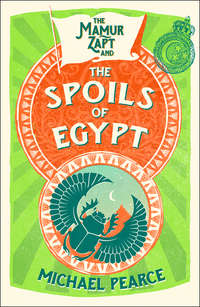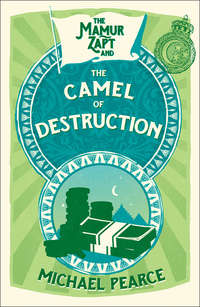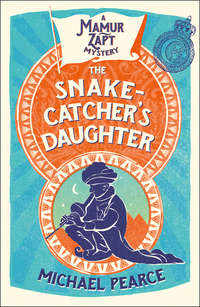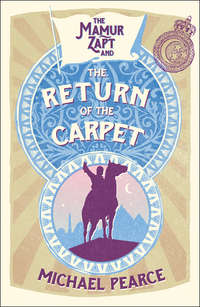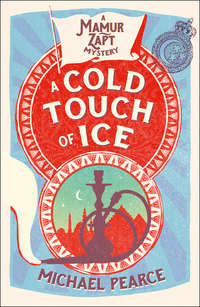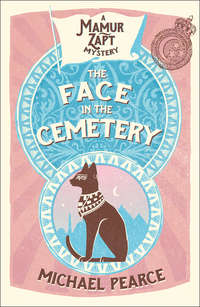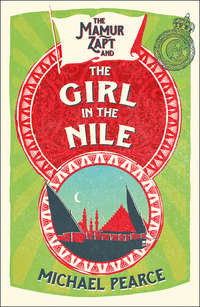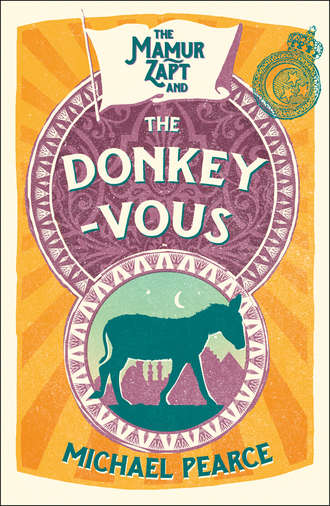
Полная версия
The Mamur Zapt and the Donkey-Vous
‘I wish to know,’ said Owen, ‘so that I can help others. I am the Mamur Zapt.’
‘There is little to tell,’ the Copt said softly. ‘That night was as other nights. We worked late. It was nearly midnight when we closed the shop. There was a little bookkeeping to do so I stayed behind.’
‘You have a key?’
‘The master left me his key.’
‘He must have trusted you.’
The Copt bowed his head in acknowledgement.
‘And then?’
‘And then I did not see him again, nor suspected anything till the servant came knocking on my door.’
Owen looked at Madame Tsakatellis.
‘When Tsakatellis did not come home,’ she said, ‘at first we thought nothing of it. He often works late. When he had not come home by one I began to wonder. When he had still not come home at two I went to his wife and found her crying.’
‘She knew something,’ asked Owen, ‘or she guessed?’
The woman made a gesture of dismissal.
‘The woman has silly thoughts. She thought Tsakatellis might be with another woman. What if he was? A wife has to get used to these things. In any case, Tsakatellis was not like that. I sent a servant in case he had stumbled and fallen or been attacked and was lying in the road. The servant came back and said he had found nothing. I sent him out again to wake Thutmose.’
‘I knew nothing,’ said Thutmose. ‘I came at once.’
‘We went out again,’ said the woman, ‘and walked by every way he might have taken. When the dawn came we began to suspect.’
‘The letter was delivered to the shop,’ said Thutmose. ‘When I saw it, I guessed.’
‘Who delivered it?’
‘A boy. Who ran off.’
‘You have the letter?’ Owen asked Madame Tsakatellis.
She went back into her recess and came back with a piece of paper.
Greetings. We have taken your man. If you want to see him again you must pay the sum of 20,000 piastres which we know you will do as you are a loving woman. If you do not pay, you will not see your man again. Wait for instructions. Tell no one.
The Wekil Group
‘Who was the letter addressed to?’
‘It was meant for her.’
‘But Thutmose brought it to you?’
‘I took it from her. She was useless. I sent a man to tell the police. A man came from the Parquet.’
‘He found nothing?’
‘He did nothing. After a while he went away and we did not see him again. Nor anyone else. Nor you, until now.’
‘And did the instructions come?’
‘No.’ The woman lifted her head and looked Owen levelly in the eyes. ‘They must have known I had sent for the police.’
‘It may not be so.’
‘It is so. I killed him. That is what she thinks.’
‘They take fright,’ said Owen, ‘for many reasons. That may not have been the reason.’
‘It would have happened anyway,’ said the woman, ‘for I would not have paid.’
There was little more to be learned, as the man from the Parquet must have found. He would have made inquiries to check if anyone had seen Tsakatellis on his way home, but the streets would have been deserted and even if someone had seen him it was unlikely that they would come forward. Cairenes did not believe in volunteering themselves for contact with the authorities. He would ask Mahmoud to check the Parquet records but he thought it unlikely that whoever had conducted the initial investigation had found anything of interest.
One last question.
‘Did Tsakatellis have enemies?’
The woman made a crushing gesture with her hand.
‘The world,’ she said.
Sometimes people used kidnapping as a way of settling old scores.
‘But no one particular? Who had sworn revenge?’
‘Tsakatellis had no enemies of that sort.’
‘A husband, perhaps?’
‘No,’ said the woman definitely.
The only question, then, was what had brought Tsakatellis to the notice of his potential kidnappers. Some display of wealth, perhaps? Unlikely. The Greeks kept themselves to themselves. They worked hard, made money and did not flaunt it.
‘What else did Tsakatellis do?’ he asked. ‘Apart from work?’
‘Nothing.’
‘Church?’
‘Ah, well, but—’
‘Did he serve on committees?’
‘No.’
‘Do things for the community?’
‘What community?’
‘Are not the Greeks a community?’
‘We have friends,’ the woman said, ‘but not many. Tsakatellis’s father had been ill for a long time before he died. The business had to be nursed back. Tsakatellis worked long hours. Had done so since he was a boy. He had no time for other things.’
‘I was wondering how they came to hear of him.’
‘I have asked myself that. Why Tsakatellis? Why not Stavros or Petrides?’
‘And what answer did you come to?’
‘I came to no answer. Except this. There is no reason. You lead your life. Then one day God reaches down and plucks you out. And throws you into the fire!’
‘It is not God who does these things. It is man.’
‘That is a comfort. With man there is always the possibility of revenge.’
Nikos was waiting for him when he got back to the office.
‘It’s come,’ he said.
‘What’s come?’
‘The second note.’
‘Telling them the arrangements for paying?’
‘Yes.’
Owen hung up his sun helmet and poured himself a glass of water from the pitcher which stood in the window where the air would cool it.
‘What does it say?’
‘They’re to put the money in a case. Berthelot’s to take it to Anton’s at about midnight and check it in to the cloakroom. He’s then to go on into the salon and stay there for about two hours. While they’re counting, presumably. When he comes out they’ll give him a receipt. On the receipt will be an address. That’s where he’ll find Moulin.’
‘Anton’s. Is he in it?’
‘Probably not. They’re just using his place, but the cloakroom people have got to be in it.’
‘They’ll only be in part of it, though, the money-passing bit. Still, that’s responsible.’
‘Incidentally,’ said Nikos, ‘they don’t tell Berthelot how to get to Anton’s.’
‘They know he already knows?’
Nikos nodded.
‘Interesting. I thought that young man didn’t get around.’
‘He gets around and they know it.’
‘That, too, is interesting.’
‘Yes. They’re unusually well informed.’
‘It doesn’t sound like a student group.’
‘Nor an ordinary Nationalist group either,’ said Nikos. ‘Certainly not a fundamentalist Nationalist group. These people know too much about tourists.’
Owen drank another half glass of water. One glass was really his ration. When it was hot you needed to take in a little liquid often, not a lot at once. He put the glass down and went on through into his own office. Nikos followed him in with an armful of papers.
‘Are you going to leave it alone?’ he asked.
‘Why not? I want the poor bastard free as much as the French do. It’s only money, after all.’
‘Well, yes,’ said Nikos, ‘but …’
‘I know what you’re going to say. Sometimes it’s not just money. It’s just money only if you’re willing to play ball. If you’re not willing it gets nasty. As in the case of the other poor bastard, that Greek shopkeeper, Tsakatellis, whom they killed.’
‘That’s not what I was going to say,’ said Nikos. ‘What I was going to say was that this is the first time they’ve taken a tourist. If you let them get away with it, it might become a habit. And then a lot of people might get interested.’
Nikos always took a detached view of cases which were merely individual. On the other hand, he had a keen eye for political essentials.
Six o’clock that evening found Owen himself on the terrace at Shepheard’s waiting for Lucy Colthorpe Hartley. Quite how he came to be there he was not certain. He had not had time to say no when Lucy had made the appointment; and would he have said no if he had? On the grounds that he was poor and they were tiresome, he made it a general practice to steer clear of the fishing fleet, as the young ladies were called who arrived in scores for the Cairo season in search, it was alleged, of husbands from among the ranks of wealthy young army officers. Besides, he considered himself more or less bound to Zeinab. On the other hand, meeting Lucy Colthorpe Hartley for a drink was hardly work, although he had said that it was when Zeinab had suggested he pick her up at six after her visit to the hairdresser’s. He decided to salve his conscience by asking Lucy some work questions when she arrived.
If she arrived at all. It was already five minutes after six, which by Owen’s standards was being late for an appointment. Perhaps she wouldn’t come, in which case he would feel a complete fool. He hoped no one would see him.
At that moment his friend, the Consul-General’s aide-de-camp, went past with a visiting foreign worthy. He gave Owen a wave behind the worthy’s back. Owen returned the wave half-heartedly.
Garvin went past talking to an Adviser from one of the Ministries. He interrupted his talking to give Owen a smile of recognition. Some hope, thought Owen bitterly, that no one would see him. Out here on the terrace he was as conspicuous as—
Well, as Moulin must have been. And how the hell had he disappeared from the terrace without anyone seeing anything?
Owen looked down the steps. There was the snake-charmer as on the day of Moulin’s kidnapping, squatting so near to the steps as to be virtually sitting on them; there were the donkey-boys playing one of their interminable games within two yards of the foot of the steps. If Moulin had gone down the steps they must have seen him.
And if he hadn’t gone down the steps? The only place he could have gone was back into the hotel. To do so he would have had to pass the Reception clerk and the people on the desk swore that he hadn’t. There were two of them, they were some of the brightest people on the hotel’s staff, the desk was public and busy, they had to be and were alert—hell, one of them was even on Owen’s own payroll!
All the same, they could have missed him. It was a busy area and they might have been busy. Also, they could only see what passed them. Reception was actually inside the hotel, in the foyer, and the people on the desk couldn’t see out on to the terrace itself. Suppose something had happened between the table where Moulin was sitting and the entrance to the hotel: Reception would not have seen it, the snake-charmer couldn’t have seen it, and the donkey-boys, well, they might or might not have seen it.
But, surely, if anything had happened on the terrace someone would have seen it? Someone at a neighbouring table? The tables were, after all, only a few feet apart. If there had been a struggle or anything of that sort—well, there couldn’t have been. The Colthorpe Hartleys, who had been at the very next table, would certainly have seen it.
But suppose the incident, whatever it was, had been smaller in scale, apparently trivial? Suppose it had occurred at a time when their attention had been distracted, perhaps deliberately? That was a possibility. He would have to ask Lucy Colthorpe Hartley if anything like that had occurred.
Owen was sitting at a table a little further into the terrace than either the one Moulin habitually occupied or the one the Colthorpe Hartleys had been sitting at that day. The table was right at the front of the terrace, so close to the railing that the street vendors touched his foot as they poked their wares through the bars. Hippopotamus-hide whips, splendid red tarbooshes, and filmy ladies’ underwear jostled for his attention. A long brown arm with a snake coiled round it was suddenly thrust in his direction; and in an instant a whole pack of postcards of scantily dressed ladies fanned itself open in the air before his astonished eyes.
‘Gracious, Captain Owen!’ said Lucy Colthorpe Hartley. ‘I did not know you were such a connoisseur.’
‘Friends of yours?’ he asked, recovering quickly.
‘Intimate,’ she replied, sinking into a chair. ‘Abdul here greets me with a different nosegay every day.’
A beaming vendor, rather darker than the others, laid a bunch of sweetly-smelling flowers on the terrace beside her.
‘They don’t last long,’ she said, ‘but for a while they brighten up the room.’
She fumbled in her purse for some token piastres.
‘Allow me,’ said Owen.
Lucy put a restraining hand on his arm.
‘Certainly not!’ she said. ‘You are interfering with long-established custom. What you can do, though,’ she added, peering into her purse, ‘is help me count up the necessary milliemes as I seem to have run out of piastres.’
‘That’s enough. A little money goes a long way here.’
‘You’d better have a talk with my father. He doesn’t seem to think so.’
‘I’m sure he won’t mind the flowers.’
‘No. But he did mind the turquoises. I took them in to Andalaft’s as you suggested, Captain Owen, and he is going to find someone to make them up for me.’
‘Do you have other regulars among the vendors, Miss Colthorpe Hartley?’
‘I have a faithful following,’ said Lucy, ‘which I attribute more to misplaced hope than to my personal charms.’
‘They follow you wherever you sit?’
‘We usually sit in the same place.’
‘Which is at this end of the terrace, of course.’
‘It is exactly there,’ said Lucy, pointing. ‘How disillusioning! There I was hoping that what had brought you here was the attraction of my big blue eyes when all the time you are merely getting on with your work.’
‘I am combining work with pleasure. A little work and a lot of pleasure.’
‘At least you have the proportions right,’ said Lucy. ‘You were, if you remember, going to tell me exactly what was your work, Mamur Zapt.’
‘Well …’ said Owen.
‘How fascinating!’ said Lucy Colthorpe Hartley, resting her elbows on the table and her chin on her hands and gazing straight into his eyes.
‘It didn’t look like work to me,’ said Zeinab.
Zeinab, unfortunately, had passed by in an arabeah on her way home from her hairdresser’s.
‘I was asking her about the street-vendors.’
‘Oh yes,’ said Zeinab sceptically.
‘Yes I was. I wanted to know if they were always the same. You see, if they were, they might have been there when Moulin was kidnapped and seen something.’
‘You were trying to see something,’ said Zeinab. ‘You were looking down the front of her dress.’
‘For heaven’s sake! She was across the table. How could I?’
‘She was leaning forward. Deliberately.’
‘Anyway she didn’t have on that sort of dress.’
‘You see! You did try!’
‘For God’s sake!’ said Owen, aware that he had lost yet another argument with Zeinab.
‘Well,’ demanded Nikos, ‘are you going to do something about it or not?’
‘I’m not going to stop it, if that’s what you mean.’
‘That’s not what I mean. The question is: do you want it watched? We don’t have to interfere at all. We could let it all go ahead as they’ve arranged, let the money change hands, wait till Moulin is freed—and only take action afterwards. That way we would get both Moulin and Zawia.’
‘Nice in theory, not so easy in practice. You’d have to be able to watch them all the way. Is that possible?’
‘It’s not easy,’ Nikos admitted.
Owen saw why when they made a reconnaissance that evening. The gambling salon was in a block of flats on the Sharia Imad-el-Din. It was on the first floor and was disguised as a scent factory. Nikos had been informing himself of its defences.
‘You get to it through the main entrance,’ he said. ‘There’s a door on to the stairs which is kept locked and has to be opened by the porter. At the top of the stairs there’s another door with a spyhole.’
‘Pretty standard.’
‘Yes. There’s an electric bell downstairs by the porter’s hand to give warning. Oh, and there’s a consular representative across the street.’
‘Which nationality is Anton claiming this week?’
‘Lebanese, I think.’
Since under the system of legal concessions to foreign governments known as the Capitulations the Egyptian police did not have right of entry to premises owned by foreigners, most gambling houses had taken the precaution of acquiring foreign ‘ownership’. To guard against misunderstandings—and misunderstandings were quite frequent as the police had often met the proprietor the week before when he was of a different nationality—the wealthier salons had taken to keeping a consular official handy on a permanent retainer for use in the event of an unexpected raid.
‘We’re not thinking of a raid, though,’ said Owen, ‘so it doesn’t matter.’
‘We’ll have to have someone inside.’
Owen looked doubtful. ‘What good would that do? They’d have to be customers. They couldn’t hang around the cloakroom. They’d have to go inside and play. They wouldn’t be able to see anything. What’s the internal geography of the place?’
‘You go through the door into a sort of vestibule. The cloakroom—it’s very small, barely room for the two attendants—is on one side. The tripot is on the other. You get to it through an arch.’
‘So you might be able to see something.’
‘You might. You’d be able to tell if someone left the tripot and went to the cloakroom. But my guess is that’s not how it will happen, anyway. I’ve been checking on the attendants in the cloakroom. There are two of them. One of them goes off duty at about one-thirty and another man comes in. I reckon that the one who goes off duty will be carrying the money with him. The timing fits. Berthelot gets there at about midnight and stays till two. By then there will have been time to count the money and the attendant will have been gone half an hour—long enough for him to be able to pass over the money.’
‘How does he leave the building?’
‘Through a side-door. I’ll have him tailed.’
‘He might not go that way this time.’
‘I think he will. They’ll want to keep it as normal as possible. In any case, though, I’ll put people all round the building. And on the roof.’
‘It’s a block of flats. There’ll be people coming and going all the time.’
‘At one o’clock in the morning? Carrying something? You’d have to have a bag or a case to carry that amount of money.’
‘I wish we could watch the cloakroom all the time.’
‘Can’t be done.’
‘What’s on the next floor up? Directly above the cloakroom?’
‘A sewing shop. Try moving all those girls.’
‘Why don’t we bribe one of Anton’s people and ask them to keep an eye on the cloakroom?’
‘They’ve got their jobs to do. They wouldn’t be able to watch all the time.’
‘All the same …’
‘As a matter of fact,’ said Nikos, ‘I already have.’
Owen had men watching Monsieur Berthelot. The following afternoon they reported that Berthelot had been to the bank twice. The second time he had come away carrying a small leather case. On both occasions he had been accompanied by a member of the staff of the French Consulate.
On a hunch Owen checked steamer bookings. Two passages had been reserved under the name of Berthelot on a boat leaving Alexandria in thirty-six hours’ time.
Mahmoud had heard nothing of any deal. Unlike Owen, he was dead against it.
‘Do it once and you’ll soon be doing it all the time,’ he said.
‘But people are doing it all the time,’ said Owen.
He could get Mahmoud not to intervene only by telling him what he himself was proposing to do.
He went back to his office and worked late. Soon after ten he went home and changed into evening dress. He put a tarboosh on his head and slipped some dark glasses into his pocket. He would not be the only one wearing them. Others besides himself would have reasons for wishing to preserve their anonymity.
It was still relatively early in the evening in Cairo terms and there were only about thirty people round the table. Berthelot was at the far end intent on the play. The table was brilliantly lit up. All the rest of the room was in shadow.
Owen played standing up, reaching an arm in when it was necessary. In that way he could keep out of the light. He wasn’t sure how effective his disguise was. He was still relatively new in Cairo and thought his face generally unknown. Still, it was the doorman’s job to know these things and he might well have spotted him. Owen thought it probably wouldn’t matter if he had. He would tell Anton and Anton would worry; but so long as Anton himself was not involved in the plot he would probably keep his worries to himself. Even if he knew what was going on in the cloakroom he would probably stay out of it. He might have received an inducement to turn a blind eye, but a blind eye was what he would turn, especially with the Mamur Zapt there. Owen doubted if he would warn them.
The important thing was that Berthelot shouldn’t recognize him. Owen didn’t think he would. He thought the disguise and the darkness was proof against that. Anyway, Berthelot was concentrating on the play.
‘Faîtes vos jeux, messieurs,’ the croupier said. ‘Faîtes vos jeux.’
Berthelot hesitated, then added to his stake.
‘Rien ne va plus.’
The croupier spun the wheel. There was a sudden intentness, a catch of the breath. The wheel slowed and came to a halt. Berthelot shrugged and turned away. The croupier began to rake in the chips.
‘It’s Anton’s lucky night tonight,’ said a Greek standing beside Berthelot.
‘It’s Anton’s lucky night every night,’ said someone from across the table.
There was a general stirring and one or two people left the table, either to refresh themselves from the jugs of iced lemonade which stood on a shelf behind them or simply to ease their backs.
Berthelot and the Greek turned at the same time.
‘Pardon, monsieur.’
‘Pardon!’
Berthelot made way for the Greek, who went over to the shelf and poured himself a glass of lemonade.
‘Monsieur?’
He offered to pour for Berthelot.
‘Merci, monsieur.’
They stood sipping the lemonade together.
‘It’s a hot night,’ said the Greek.
‘Is it always as hot as this?’
There were fans working but since the room had no windows they merely moved the hot air round.
‘It’s been hot all day. Monsieur is new to Cairo?’
‘We’ve been here just over a month.’
‘Ah. Not long enough to get used to it.’
‘How long does it take to get used to it?’
The Greek spread his hands. ‘A lifetime. And then it’s no use!’
They went back to the table. The play began again.
The room was long and thin with deep luxurious carpets and heavy wood panelling. A door led off into an inner room, out of which waiters emerged regularly with drinks. They brought the drinks to the players. There was no bar as such. Drink was incidental at Anton’s. Besides, most of the players were Moslem.
An arch behind Owen led back into the entrance vestibule. Through it he could see one end of the cloakroom counter. Since Berthelot had arrived one player had left and four more had entered. The one who had left had departed soon after Berthelot had appeared and, Owen thought, had gone straight past the cloakroom. It was a hot evening and very few people had brought coats. A number had brought walking sticks which they deposited.
Конец ознакомительного фрагмента.
Текст предоставлен ООО «ЛитРес».
Прочитайте эту книгу целиком, купив полную легальную версию на ЛитРес.
Безопасно оплатить книгу можно банковской картой Visa, MasterCard, Maestro, со счета мобильного телефона, с платежного терминала, в салоне МТС или Связной, через PayPal, WebMoney, Яндекс.Деньги, QIWI Кошелек, бонусными картами или другим удобным Вам способом.


